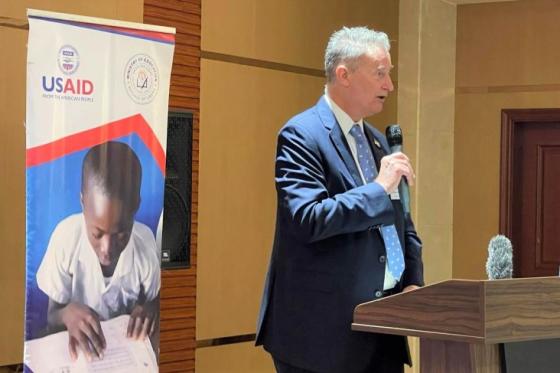Liberia: USAID Closes Early Grade Reading Program in Six Counties

Ambassador McCarthy stated that the United States shares Liberia's belief that investing in high-quality education is a major driver of development
The five-year early grade reading program run by the United States Agency for International Development (USAID) , which benefitted 5,000 kindergarten students and 4,500 teachers in Lofa, Bong, Grand Bassa, Nimba, Margibi, and Montserrado counties, has been discontinued.
Launched in 2017, the Read Liberia program assisted the government of Liberia in providing improved early grade reading instruction to 180,000 children in grades 1 and 2 from 640 public primary schools, and trained instructors in the early grade reading technique, 391,418 teaching and learning materials were delivered, and more kindergarten students benefited from enhanced reading abilities and vocabulary development.
The program, according to a press release from the U.S embassy, boosted the oral vocabulary literacy skills of over 2,700 kindergarten students from 60 public schools and made sure that roughly 57,000 students in grades 1 and 2 could read grade-level text fluently with comprehension. Compared to pupils reading only 14 words per minute before the start of the Read Liberia Program, students in Read Liberia schools can now read twice as many correct words per minute.
The release added that these interventions caused a sharp rise in the percentage of grade 2 students who were able to read 35 accurate words per minute, from 13% to 35%. Speaking at the occasion, Ambassador McCarthy stated that the United States shares Liberia's belief that investing in high-quality education is a major driver of development and one of the most effective ways to combat poverty, as well as to promote health, gender equality, peace, and stability.
“The U.S. Government will continue to invest in educating young Liberians, especially at the early grade level. Because research shows that quality investments at that level, have significant multiplier impacts over the lifetime of children,” said Ambassador McCarthy. In remarks, Assistant Education Minister for Fiscal Affairs, James Massaquoi thanked the U.S. Government for the support to the program that has impacted the lives of the children of Liberia.
He declared that it was finally time for parents to actively participate in their children's education as opposed to only acting as passive onlookers. The program was created to assist the Liberian government in meeting its commitment to enhance evidence-based reading instruction, provide teaching and learning materials, and enhance early grade reading classroom instruction, service delivery, parent, community, and private sector support. It does this by drawing on research produced by USAID and its partners.
Read Liberia collaborated with the Ministry of Education to update existing resources and create new teaching and learning tools, such as teacher instructional manuals, student activity books, storybooks, and supplemental readers for kindergarten, grades 1 and 2, in order to further assist the Ministry of Education. To teachers and students, more than 15,395 textbooks and other instructional materials were given out. The initiative involved 635 parent-teacher associations in early grade reading programs that gave parents and other community members the tools they needed to lead their school communities in promoting and fostering a culture of excellence in reading.
Through embedding technical assistance to MOE, the Read Liberia Activity implemented best practices from around the world that are supported by empirical research and building on past early grade reading programs.
